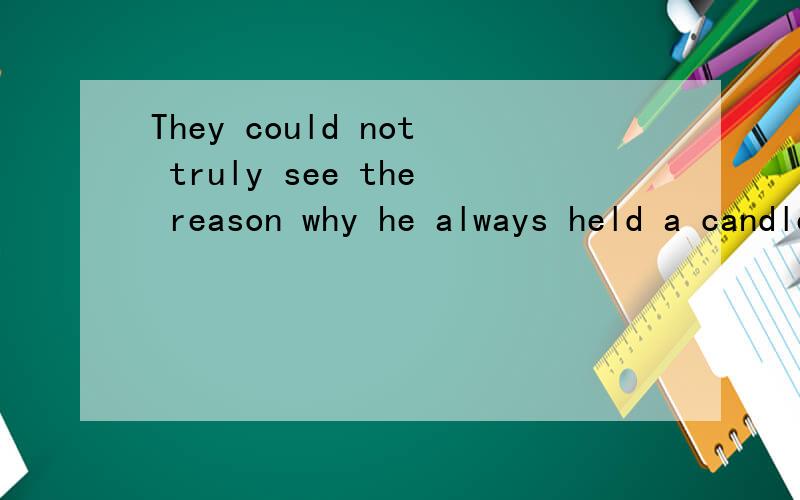They could not truly see the reason why he always held a candle.why后是定语从句还是同位语从句?
来源:学生作业帮助网 编辑:作业帮 时间:2024/11/26 19:46:08

They could not truly see the reason why he always held a candle.why后是定语从句还是同位语从句?
They could not truly see the reason why he always held a candle.why后是定语从句还是同位语从句?
They could not truly see the reason why he always held a candle.why后是定语从句还是同位语从句?
楼上错了,
是关系副词WHY引导的定语从句
若同位语从句则WHY前后表达的是同一个意思
同位语从句和定语从句的三点区别
同位语从句和定语从句很相似,但还是有区别的,区别主要在以下三方面:
1.从词类上区别
同位语从句前面的名词只能是idea,fact,news,hope,belief,suggestion,proposal,word,thought,doubt,truth,possibility,promise,order等有一定内涵的名词?而定语从句的先行词可以是名词?代词?主句的一部分或是整个主句?如:
The possibility that the majority of the labour force will work at home is often discussed.人们经常讨论大多数劳动力将会在家里工作的可能性?(同位语从句)
We are not looking into the question whether he is worth trusting.我们正在调查的问题不是他是否值得信赖的问题?(同位语从句)
Word came that he had been abroad.据说他已经出国了?(同位语从句)
Our team has won the game,which made us very happy.我们的队赢了,这让我们很高兴?(定语从句)
The doctor whom you are looking for is in the room.你找的那位医生在房间里面?(定语从句)
His mother did all she could to help him with his study.他妈妈尽她的最大努力帮助他的学习?(定语从句,代词all作先行词?)
2.从性质上区别
定语从句是从句对其先行词的修饰或限制,属于形容词性从句的范畴;而同位语从句是从句对前面抽象名词的进一步的说明和解释,属于名词性从句的范畴?如:
The news that our team has won the game was true.我们队赢了那场比赛的消息是真的?(同位语从句,补充说明news到底是一个什么消息?)
The news that he told me yesterday was true.昨天他告诉我的那个消息是真的?(定语从句,news在从句中作told的宾语?)
I made a promise that if anyone set me free I would make him very rich.我许诺如果谁让我自由,我就让他非常富有?(同位语从句,补充说明promise到底是一个什么诺言?)
The mother made a promise that pleased all her children.妈妈做出了一个令她的孩子们高兴的许诺?(定语从句,promise在从句中作pleased的主语?)
3.从引导词及其在句子中的成分上区别
有些引导词如how,whether,what可以引导同位语从句,但不能引导定语从句?如:
That question whether we need it has not been considered.我们是否需要它这个问题还没有考虑?(同位语从句)
I have no idea what has happened to him.我不知道他发生了什么事?(同位语从句)
引导词that引导定语从句时,在从句中一般作主语或宾语(指物时还可以用which代替),并且作宾语时常常省略?that在同位语从句中仅起连接作用,不充当任何成分,并且不能省略,也不能用which来代替?如:
The order that we should send a few people to help the other groups was received yesterday.我们应派几个人去帮别的几个小组的命令昨天收到了?(同位语从句,是对order的具体解释,that虽不作成分,但不能省略?)
The order that we received yesterday was that we should send a few people to help the other groups.我们昨天收到的命令是我们应该派几个人去帮助别的几个小组?(定语从句,是名词order的修饰语,that在从句中作received的宾语,可以省略?)
最后我们在一起来做三道练习题:
1.Along with the letter was his promise ____ he would visit me this coming Christmas.(2004上海春季高考)
A.which B.that
C.what D.whether
2.The other day,my brother drove his car down the street at ____ I thought was a dangerous speed.(2004上海春季高考)
A.as B.which
C.what D.that
3.Luckily,we'd brought a road map without ____ we would have lost our way.(2004北京春季高考)
A.it B.that
C.this D.which
答案:1.B 2.B 3.D
同位语从句
他们没法真正了解他总是举着蜡烛的原因
是同位语从句,可以省略the reason,
They could not truly see why he always held a candle
和下面一样the reason可以省略
That is (the reason) why he raised the question.
这就是他所以提出问题的原因。<...
全部展开
他们没法真正了解他总是举着蜡烛的原因
是同位语从句,可以省略the reason,
They could not truly see why he always held a candle
和下面一样the reason可以省略
That is (the reason) why he raised the question.
这就是他所以提出问题的原因。
如果是定语从句,那被修饰的对象不可以省略
收起
同位语从句,可以省略the reason
楼上错了...二楼正解...
让我用通俗的语言回答..
首先定语从句也称为形容词性从句....所谓形容...就是对先行词进行修饰限制.....
其次同位语从句是名词性从句....所以它起的不是修饰限制....而是解释说明....它的连词前主要是message,suggestion,words(消息),possibility,news,idea,fact,promise,qu...
全部展开
楼上错了...二楼正解...
让我用通俗的语言回答..
首先定语从句也称为形容词性从句....所谓形容...就是对先行词进行修饰限制.....
其次同位语从句是名词性从句....所以它起的不是修饰限制....而是解释说明....它的连词前主要是message,suggestion,words(消息),possibility,news,idea,fact,promise,question等等等等这样有内涵性的词汇....具体说明这些内容是什么。
那么分析楼主的句子.......
看上去似乎后面的从句是解释说明了the reason是什么....但是不是!
让我们把句子翻译出来看,
他们没法真正知道他持着蜡烛的原因。。。那么他为什么持着蜡烛呢?情人死了?要许愿?过节?还是神经有毛病?...这个原因我们不知道!所以从句只是修饰限制了the reason .....并没有告诉我们the reason是啥玩意!!!
所以这个句子就是以关系副词why引导的定语从句......
结合二楼复制的一大片应该可以明白了!!
哇~哈哈哈哈~够通俗了吧?..........我还是个中学生....但是我敢确定~~~~这些都是有道理的!所以慢慢分析出来就能明白!!!OK!!
收起